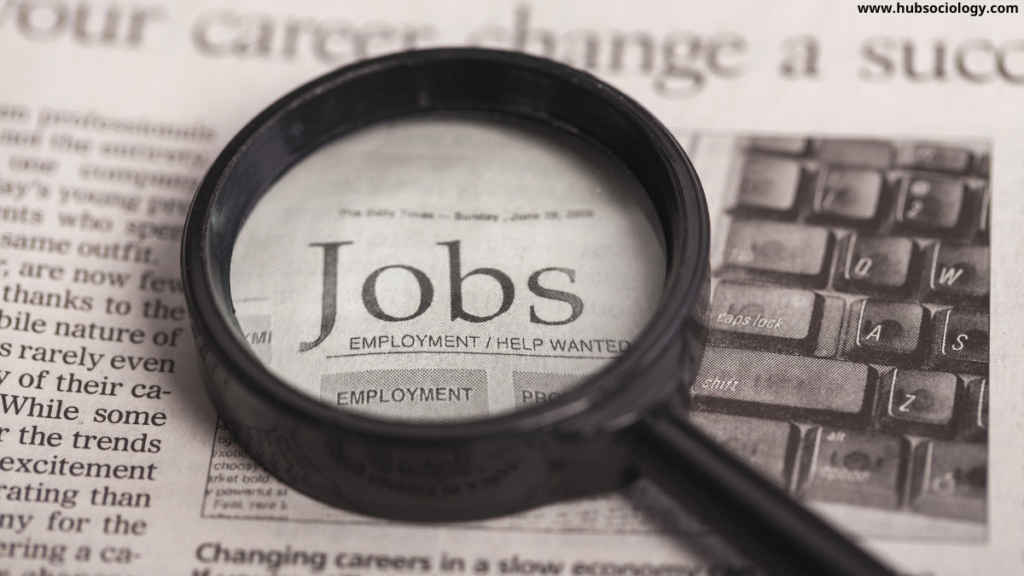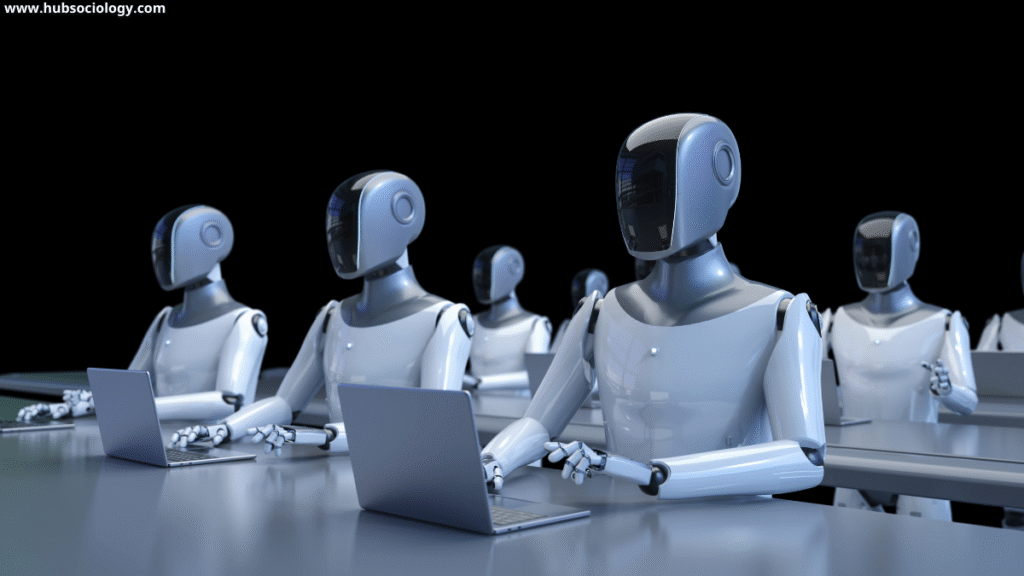Introduction on AI Replacing Jobs
The rise of Artificial Intelligence (AI) in the 21st century represents one of the most profound transformations in the history of work. From automated factories to algorithm-driven customer service, AI technologies are increasingly taking over functions that were once the domain of human labor. This development raises critical questions about employment, inequality, and the human experience of work. Within sociology, Karl Marx’s theory of alienation provides a powerful lens to analyze these shifts. Alienation, as Marx described, refers to the estrangement of workers from the products of their labor, the labor process, their fellow workers, and their own human essence. In the digital age, AI not only reshapes economies but also intensifies or transforms alienation in new ways.
This article explores how AI-driven job replacement reflects and deepens Marx’s concept of alienation, highlighting the sociological implications for workers, society, and the future of labor.

Marx’s Theory of Alienation: A Sociological Foundation
Marx argued that under capitalist modes of production, labor is commodified, and workers are separated from their true creative potential. He identified four dimensions of alienation:
- Alienation from the Product of Labor – Workers do not own what they produce; the product belongs to the capitalist.
- Alienation from the Process of Labor – Work becomes repetitive, mechanized, and controlled, leaving no room for creativity.
- Alienation from Fellow Workers – Competition among workers prevents solidarity.
- Alienation from Human Essence – Work, which should be an expression of human creativity, is reduced to mere survival.
In Marx’s time, industrial machinery intensified these conditions. Today, AI technologies not only replace physical labor but also cognitive and creative tasks, which pushes alienation into new sociological dimensions.
AI and the Changing Nature of Work
AI is no longer confined to manufacturing. It has expanded into white-collar professions such as law, finance, education, journalism, and even healthcare. Algorithms can write news reports, conduct data analysis, and generate art, challenging the assumption that creativity and intelligence are uniquely human domains.

For workers, this means:
- Job Displacement: Routine and mid-level jobs are increasingly vulnerable to automation.
- Job Polarization: High-skill jobs requiring human oversight and low-skill service jobs remain, while middle-class jobs disappear.
- Surveillance and Control: AI is used to monitor productivity, track movements, and evaluate workers’ performance, often leading to stress and job insecurity.
Thus, AI does not only replace jobs but restructures the very nature of employment in ways that align with and expand Marx’s alienation thesis.
Alienation from the Product of Labor in the AI Era
In the AI-driven workplace, the products of human labor are often intangible—data, algorithms, or digital services. Yet, workers have even less ownership of these outputs than in the industrial age. For example:
- A software engineer who contributes code to an AI platform has no ownership of the resulting algorithms, which are monetized by corporations.
- Call center workers training AI chatbots are indirectly teaching systems that will eventually replace them.
- Artists and writers see their works scraped by AI models, generating profit for tech firms without compensation.
Here, alienation deepens because not only are workers estranged from the products they create, but AI also absorbs their knowledge and creativity, turning it into capital. In this sense, human intellectual contributions are commodified more invisibly and comprehensively than physical labor ever was.
Alienation from the Process of Labor
One of Marx’s central critiques was that industrial workers were reduced to machine operators, losing autonomy over their labor. In the digital age, AI magnifies this alienation by stripping workers of decision-making power:
- Algorithmic Management: Gig workers, such as delivery drivers or ride-share operators, are controlled by opaque algorithms that dictate their routes, pay, and performance evaluation.
- Predictive Analytics: Office workers find their tasks increasingly guided by AI-generated insights, leaving little room for human judgment.
- Automated Monitoring: AI surveillance tools measure keystrokes, screen time, and productivity, creating a sense of constant oversight.
Unlike earlier mechanization, which reduced labor to repetitive physical tasks, AI transforms work into obedience to algorithms, leaving workers alienated not only from the process but also from their own agency and decision-making.
Alienation from Fellow Workers
AI reshapes social relations in the workplace in complex ways:
- Individualization of Work: Remote work technologies and AI-driven platforms isolate workers from collective experiences of labor.
- Competition with Machines: Instead of competing solely with fellow workers, employees now compete with AI systems for efficiency and relevance.
- Fragmented Labor Markets: Gig economy platforms pit workers against one another for short-term contracts, reducing opportunities for solidarity.
This dimension of alienation is intensified because workers are increasingly disconnected from both their peers and their sense of collective identity. AI, by replacing traditional forms of collaboration with individualized and competitive structures, weakens solidarity and makes resistance to exploitation more difficult.
Alienation from Human Essence
For Marx, human essence lies in the ability to engage in creative, purposeful activity. Work, in its ideal form, should allow individuals to express themselves and contribute meaningfully to society. In the AI era, this essence is under threat:

- Devaluation of Creativity: As AI generates art, music, and literature, human creativity risks being undervalued.
- Reduction to Data Points: Workers become measurable units of productivity rather than holistic beings.
- Existential Displacement: When machines perform intellectual tasks once considered uniquely human, individuals may question their purpose and value.
This form of alienation is perhaps the most profound. It challenges not just the role of the worker in the economy but the very meaning of being human in a digital capitalist system.
AI, Capitalism and the Expansion of Surplus Value
AI is not inherently alienating; rather, its development under capitalism amplifies alienation. From a Marxist perspective, AI serves as a tool for capital accumulation:
- By reducing labor costs, companies extract greater surplus value.
- By replacing workers, corporations weaken labor power and unionization.
- By monopolizing AI technologies, a few tech giants consolidate wealth and control.
The alienation caused by AI is therefore not technological in essence but sociological—rooted in capitalist relations of production. If AI were deployed in a socialist framework, its potential could be redirected to reduce drudgery and expand human freedom.
Sociological Implications
- Class Restructuring: AI creates a new division between those who own and control AI technologies (the digital bourgeoisie) and those whose jobs are displaced or controlled by AI (the digital proletariat).
- Inequality: Wealth concentration in the hands of tech corporations widens the gap between capital and labor.
- Workplace Surveillance: AI normalizes control and surveillance, creating a culture of mistrust and anxiety.
- Identity and Meaning: The erosion of meaningful labor challenges traditional notions of identity, dignity, and purpose.
- Social Movements: As alienation deepens, there may be renewed interest in collective resistance, whether through unions, worker cooperatives, or movements advocating for universal basic income.
Toward a Sociology of Post-AI Work
If Marx’s alienation remains relevant, the question is how society can respond. Several possibilities exist:
- Universal Basic Income (UBI): Detaching survival from employment could reduce economic alienation, though it may not address the loss of meaning in work.
- Democratization of AI: If workers had collective ownership over AI systems, alienation could be minimized, turning AI into a tool of liberation rather than exploitation.
- Redefining Work: Society may need to redefine work beyond wage labor, emphasizing creativity, care, and community contributions.
- Human-AI Collaboration: Instead of replacement, AI could be developed as a partner to augment human potential, preserving agency and creativity.
These solutions require rethinking not just the role of AI but the broader capitalist structures in which it operates.
Conclusion on AI Replacing Jobs
Karl Marx’s concept of alienation provides a powerful framework for understanding the sociological impact of AI replacing jobs. Far from rendering Marx irrelevant, the digital age makes his analysis more urgent than ever. Alienation today extends beyond the factory floor into the algorithm-driven workplaces of the global economy. Workers are estranged from their products, their processes, their peers, and even their human essence in new and intensified ways.
The challenge for society is not merely technological adaptation but the reorganization of social and economic relations. If AI continues to develop under capitalist imperatives, alienation will deepen, and inequality will grow. However, if harnessed collectively, AI has the potential to liberate humanity from drudgery and allow individuals to reclaim their creative essence.
In the end, the future of work in the digital age depends less on the capabilities of AI and more on the social choices humanity makes. Marx’s critique reminds us that alienation is not inevitable—it is the product of social relations, and it can be transformed.
Do you like this this Article ? You Can follow as on :-
Facebook – https://www.facebook.com/hubsociology
Whatsapp Channel – https://whatsapp.com/channel/0029Vb6D8vGKWEKpJpu5QP0O
Gmail – hubsociology@gmail.com
Topic-Related Questions
- How does AI replacing jobs reflect Karl Marx’s theory of alienation in modern society?
- What are the social consequences of AI replacing jobs in both developed and developing countries?
- In what ways is AI replacing jobs leading to new forms of class inequality?
- How is the process of AI replacing jobs affecting human creativity and identity in the workplace?
- Can AI replacing jobs be seen as an extension of capitalist exploitation in the digital age?
- What role does workplace surveillance play when AI is replacing jobs in service industries?
- How does AI replacing jobs influence the solidarity and collective consciousness of workers?
- Is AI replacing jobs contributing to a crisis of meaning and purpose in human labor?
- How might universal basic income address the social challenges caused by AI replacing jobs?
- What sociological theories besides Marx’s alienation can explain the impact of AI replacing jobs?
- How does AI replacing jobs reshape the structure of the global labor market?
- Can democratization of technology reduce the negative impacts of AI replacing jobs?
- What ethical issues arise from AI replacing jobs in creative and intellectual fields?
- How are gig workers particularly vulnerable to the effects of AI replacing jobs?
- In the future, could AI replacing jobs also create new opportunities for human liberation from repetitive labor?
